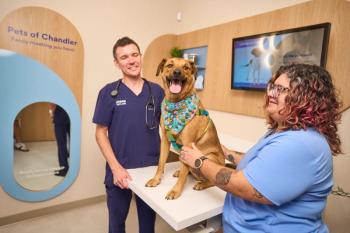
- April 2018
- Volume 2
- Issue 3
The Seller's Dilemma: Private or Corporate Buyer?
Veterinarians looking to sell their practice must weigh the needs and expectations of potential buyers against their own financial situation and desires.
Practice owners who wish to sell their business face a tough challenge: To whom should they sell? In some cases, an associate veterinarian may be ready to purchase the practice, but is that person as financially qualified as a corporation might be? Which entity is likely to pay more for the practice, and how important is it for the seller to obtain the highest price possible?
To get a better handle on which buyer is the better choice, the seller must compare the common expectations and needs of an associate or private buyer with those of a corporate buyer. It’s also important to determine expected earnings from the sale.
Priority Factors
Both buyers and sellers should consider these three common factors.
Location
The common mantra “location, location, location” applies in veterinary medicine, too. We have been in the midst of a veterinarian shortage for nearly two years. Some older practice owners are selling because they are unable to find an associate and the workload has become too much for them. Practices that are most likely to attract new associates or private buyers are those that offer locale, livability and/or a family member already in the area.
RELATED:
- Video: Should You Sell Your Practice Privately or Corporately?
- Your Practice's Growth Starts With You
Location is less significant when considering corporate buyers because they are likely to have associates who can transfer easily
to a new location. Corporations care more about access to a regional management team and the presence of a demographic that will support the minimum size and growth required.
Number of Doctors and/or Gross Revenue
Private buyers want colleagues with whom they can collaborate on medical cases, but they usually do not have a minimum requirement for the number of associates employed at the practice. For corporate buyers, however, this matters. Corporations look for economy of size and efficiency, which typically translates to three veterinarians and a gross annual revenue of more than $1 million. Some corporate buyers have even raised their minimum revenue requirement to $2 million per year. Private buyers who are aware of the efficiencies and economies required to turn a profit usually want a practice that brings in at least $500,000 in annual revenue.
Sale Price
Fair market value (FMV) is an important consideration for private buyers, whereas investment value is critical for corporate buyers.
This is where sellers face big decisions. Practices purchased by private buyers are typically sold for FMV. Corporate buyers, on the other hand, are often willing to pay up to 25 percent over FMV for a small animal practice that meets their criteria.
Often, private buyers face the heartbreak of
not being able to satisfy the financing required
to match a corporate buyer’s offer. Practice sale price, as calculated by veterinary practice valuators, is based on historical performance and profit- and-loss statement analysis, which is verified by tax returns, and concludes with an adjusted net cash flow — also known as adjusted earnings before taxes, depreciation and amortization (EBITDA). This financial result is then capitalized at a market rate generally resulting in a multiple of 4 to 5.2 for FMV, after consideration of specific subjective factors and the cost of capital.
If a corporate buyer offers more than 25 percent above FMV, the only way the seller can help an associate buyer reach the sale price is to help with financing secondary to a bank loan and extend the payback period beyond the common bank term of 10 to 15 years. Even then, banks may decline to lend if the practice’s total debt exceeds FMV.
Additional Considerations
Profitability (defined as excess cash earnings on a normalized cash accounting or an adjusted EBITDA basis) is not the only value that helps establish a sale price. Cash flow also determines the buyer’s financing payment plan and the corporate buyer’s needed return on investment. In an FMV sale to a private buyer, the buyer is generally not as concerned about whether the normalized cash profitability is in the 5, 10 or 15 percent range, as long as the practice will provide a reasonable wage to the buyer and sufficient cash for payments. Corporate buyers commonly will not consider purchasing a practice with less than a 12 to 15 percent adjusted cash flow or adjusted EBITDA.
Seller financing is a
common requirement
for a private buyer
depending on the sale
price and the buyer’s
financial condition.
Most corporate buyers
do not require any
financing. Some
sellers prefer to carry
a portion of it to
maintain a source of income and reduce sales tax by using the installment sale rules provided by the Internal Revenue Service.
Partial sale — when a seller wants to remain in control or is willing to become an equal or minority owner over a determined period of years — initially works for some sellers and private buyers. Very few corporate buyers agree to a partial practice purchase, but, in my experience, those that do consider it will demand majority ownership status and a controlling interest purchase.
Continued employment of the seller is a common condition of sale for both private and corporate buyers. To help transfer the goodwill of the practice, most private buyers want a seller to continue working in the practice after the acquisition, and most sellers are willing and able to do so for up to three years. Corporate buyers usually demand at least one to three years of seller commitment following the closing.
Including real estate in the sale is common among private buyers; similarly, lenders like to lend on both a practice and its associated real estate when economically feasible. Corporate buyers generally prefer not to purchase any real estate. If the current owner requires that it be included in the sale, some corporate buyers will have an independent party purchase the real estate and lease it to them.
Questions Pertaining to the Sale
Some sellers want to choose a successor who will take on the practice’s clients. Of course, selling to a current associate automatically achieves this goal. Likewise, selling to a local veterinarian provides a higher likelihood of meeting client desires.
When selling to a corporate buyer, many owners enlist the assistance of a practice sales broker who can bring more than one soliciting corporate buyer to the offer point. Corporate buyers often keep current associates in place, at least for the short term, to maintain consistent relationships with the seller’s clients.
Will management and leadership skills training be available?

It’s common for sellers to request skills training to help reduce stress on themselves and their current staff. With a private sale, outside training may not be possible, but corporate buyers have the economies and contacts to provide it, which could tip the scales in their favor.
Who will manage the practice?
Although some associate buyers provide outside management, most tend to rely on the continuance of current managers, if any. Corporate buyers vary as to whether they will keep current employees or bring in pretrained staff from other clinics.
Will employee benefits change?
Staff benefits typically include medical, dental and vision insurance, as well as supplemental expense reimbursements. An associate or private buyer usually keeps these as is, but corporate buyers, which may have access to larger group plans, might increase the coverage choices.
Similarly, retirement benefits usually do not change — and may even decrease — when a practice is acquired by a private buyer. A corporate buyer commonly can provide more retirement and/or disability benefits.
How long will it take to close
the sale?

It typically takes much longer to close with a private buyer than with a corporation, largely because corporate buyers have the cash on hand to fund major purchases. Private buyers often need to obtain financing, so the sale may take up to six months to close. Corporate sales may close in as few as 45 days.
What is the sale process and documentation?

Most buyers prefer to use a nonbinding letter of intent for basic terms like price and payback plans. After some due diligence, the letter of intent is followed by a purchase and sale agreement — also known as an asset purchase agreement — that becomes binding after certain contingencies are met.
Private buyers also typically pay an earnest money deposit to the seller. As investment value buyers paying a higher purchase price, corporations often can get sellers to waive this deposit.
Don’t Undervalue
 the Process

Selling or buying a veterinary practice involves a major financial and emotional commitment
for all involved. It should not be taken lightly or done without help and consultation from experts. Sellers usually obtain a higher sale price when they use a practice broker, even if an offer to purchase has already been made.
Likewise, to prevent overpaying, private buyers should work with a buyer representative — perhaps a consultant with experience in the field or someone who understands veterinary practice valuations. Representatives should possess a certified valuation analyst or a similar qualification.
Dr. Salzsieder owns two multidoctor small animal practices, a law of ce and a veterinary practice brokerage, with his son as a partner, doing valuations and practice sales in nine western states for Total Practice Solutions Group. He is a founding member and distinguished life member award recipient of VetPartners and a founding member of the American Veterinary Law Association.
Articles in this issue
over 7 years ago
Disruptive by Designover 7 years ago
Aquarium Medicine: An Ocean of Possibilitiesover 7 years ago
Shut the Revolving Door - Part 4: Recruitingover 7 years ago
Beyond Gadgets and Gizmosover 7 years ago
Mailbag (April 2018)over 7 years ago
Advice Unleashed (April 2018)Newsletter
From exam room tips to practice management insights, get trusted veterinary news delivered straight to your inbox—subscribe to dvm360.






